12.11.15
Posted in Europe, Patents at 8:30 am by Dr. Roy Schestowitz
Summary: A primer before a short series about the President’s ‘close contact’ — to use a pun — with rich and powerful people inside France and outside of France
THERE is a coming series which shall explore and deal with Battistelli’s political and/or high-class connections. It will soon be more evident and clear why these are relevant to the EPO situation. Battistelli is a public figure from a rich children’s school (we have these in the UK also), so a lot of this information is in the public domain.
The EPO’s relationship with big business is not exactly news. We have remarked on it several times before and so have others. Several years ago Benjamin Henrion uploaded this document [PDF] with EPO interviews and quoted from it as follows, regarding politics (emphasis is ours):
I would like to make some comments about the EPO and the way it functions. In a very schematic and direct manner, the EPO is not politically driven even if all the contracting states are represented in it. A technical link between the EPO and the European Commission would be desirable even if some member states are not part of the EU. It would be desirable that a ministerial session be organized at the very same level of the EPO Administrative Council in order to define trends and to discuss a certain number of developments. By bringing politics (in the positive sense) into the Administrative Council and the EPO, public opinion will see the importance given by the political class to these issues.
More interesting, however, are the parts about big business (or capitalised, Big Business). Consider these revealing statements from EPO interviews:
The relevance of big business has to be taken into account. The EPO has really become the exclusive preserve of large corporations, and this reality should be admitted. It is probably quite unrealistic to think that the EPO can be relevant to the small inventor, although ironically the EPO`s distinctive logo represents an inventor`s thumbprint intended thereby to indicate individuality and originality.
When the EPO has meetings/seminars to consider the patent system, who can afford to attend? Only those whose flights are paid for. Corporations have to make profits and they will make increasing demands for a system which appeals to them. Good civil servants the guardians of the public good will have to learn to say “no” and this may be difficult for the EPO, since it needs fees to maintain a system to pay for itself. So your initiative today deserves credit.
Here is another one:
If I had a crystal ball and you were able to ask one question about the future, what would your question be?
Will governments in developed countries be able to detach from big industry`s influence and adopt a patent policy based on public interest rather than narrow industry interests?
There may be many unexpected events in the future, but the main issue for the patent system will depend on the answer to this question. Today governments in the developed world do not base their decisions on the interests of consumers and society at large. The main users of the system, the large companies, carry too much influence.
The following serves to remind us of close contact with big businesses like Microsoft:
Any patent reform needs to take all the circumstances into account and resist the lobbying of the more powerful. Otherwise, we run the risk of discrediting the system even further.
So what really is the EPO becoming if not just an instrument of the rich and the powerful?
One source recently told us that President Battistelli is close to a lady who isn’t particularly liked in Europe. We’ve so far managed to verify some of these claims in photographic form (at least).
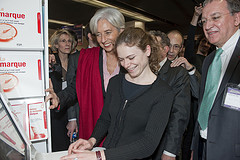
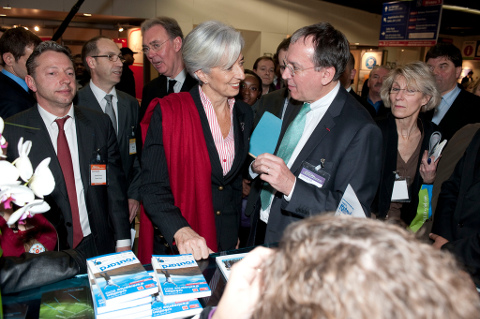
This one is from INPI’s Web site (inpi.fr):

A lot of the EPO's current management came from INPI, basically following their master.
Stay tuned. There is a lot more. Christine Lagarde is relatively ‘small fish’ in a much bigger pool of money and power that Battistelli rubs shoulders with. Some people suspect that this is why Battistelli manages to get away with so many scandals (he is now being called sloeber, which means exactly that). █
Permalink
 Send this to a friend
Send this to a friend
12.10.15
Posted in Europe, Patents at 9:43 pm by Dr. Roy Schestowitz
A fair trial… fair enough for the king.
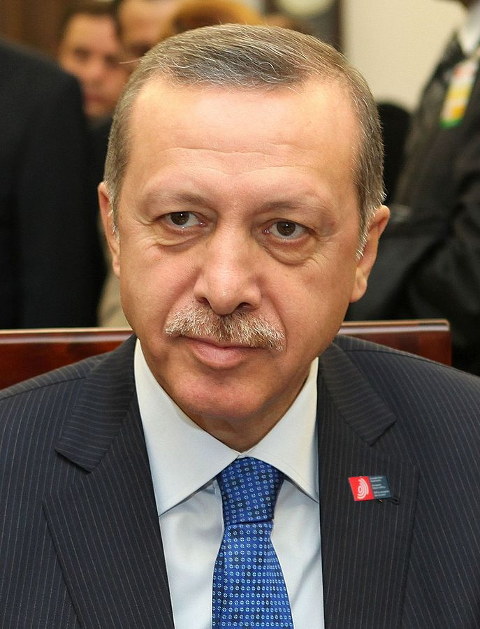
Summary: Justice at the European Patent Office (EPO) remains elusive because a so-called ‘investigation’ seems more like a retroactive (going years into the past) exercise in dirt-digging, character assassination (of the accused), and insistence on overwhelming secrecy (in this public institution enjoying a state-granted monopoly)
IT IS important for Techrights to show the low standards for dismissal of perceived threats at the EPO, even staff representatives. Team Battistelli wants to keep everything secret (except perhaps the character assassination against defendants), so wouldn’t that be just? The EPO wants a “trial by media” with gross omissions and neglect of context, defense, etc.
Last night we responded to the EPO management‘s preparatory notes of the so-called ‘investigation’ which is really just union busting disguised as something else. Here are some of “The Charges” on which we wish to comment based on our limited understanding of the situation:
11. Statement of Facts: The first charge arises from investigations C-62, 62a and 62b/2014 conducted by the IU.
Any investigation conducted by the goons of Team Battistelli cannot be treated as objective or independent. We already know, based on another investigation, that the I.U.'s work is highly deficient. It’s political and it’s controlled from above, by Team Battistelli.
2) failed to cooperate with the investigative procedure, inter alia refusing to appear at an interview to which she had been invited by the IU.
This was acceptable, based on these lawyers' take, which we put in text the other day. The I.U. is somewhat of a sham because it obviously disregards basic human rights. Rejecting it isn’t just an act of civil disobedience and investigation of the Investigative Unit is probably well overdue because it does not seem to comply with international standards [1, 2, 3, 4, 5, 6, 7]. No wonder people at the EPO call it the "gestapo".
20. Pursuant to Article 14 (1) ServRegs, a permanent employee shall carry out his duties and conduct himself solely with the interests of the European Patent Organisation in mind.
First of all, it’s not known if the accused was actually disseminated anything as alleged. Moreover, there are higher priorities sometimes.
The EPO insists that people who work for the EPO should conduct “solely with the interests of the European Patent Organisation in mind.” When one becomes aware of apparent misconduct, however, one should be allowed to blow the whistle, even inside an international body. People who work at the EPO don’t deserve to be reduced to slaves without speech or consciousness. To suggest otherwise would evoke all sorts of famous novel names/titles.
It is worth noting that whenever the accuser says stuff like “repeated dissemination of information” there’s basically a reference to an entirely another person, another case, and another dubious set of allegations. So it’s all an effort to bring forth guilt by association, where association is established by something quite loose like mere communication.
The accuser talks about “causing a corresponding risk of damage to the public image of the European Patent Organisation” as if the EPO has got some sort of God-given right to a good public image, irrespective of the management’s actions. There is later a claim about “safeguarding of the integrity and reputation of her employer.” This basically is a demand for blind loyalty.
Having failed to actually make much headway with a case against the defendant, a secret accuser is then brought into the text to attack the defendant’s character from a vacuum, with repetition of the word "sniper" (plentiful). This comes across like a cheap personal attack, or ad hominem tactics. It goes on for many pages (endless repetition) in an effort to paint the accused as a sort of harasser, which is so hypocritical a claim coming from the EPO’s management. These personal attacks are so cheap that they’re not even worth broadcasting and responding to. They serve to show just how desperate Team Battistelli is to destroy the character of the defendant. It’s a common technique in high-profile national security cases.
Skipping a lot of the ad hominem we get to:
77. On 18.09.2015 the Office received a reply sent by Ms Zegveld on behalf of the defendant denying any liability for breach of confidentiality and claiming inter alia that it was the defendant’s right as staff representative to inform all staff about the investigation being conducted against her (Annex 19).
Seems reasonable enough. We wrote about this before.
Then again the EPO reverts back to the notion that it can bust unions in secret:
87. By the further e-mail sent by the defendant on 17.11.2015 to all the other members of the Munich including those who had not been involved in any capacity whatsoever with the said investigation, and to she has demonstrated again the intentional disregard of the confidentiality requirements which form a necessary part of her employment with the EPO.
Well, union-busting isn’t exactly an ordinary situation and informing others that it is happening may be essential and justifiable. It’s evident that Team Battistelli wants a monopoly on power and it wants to acquire and secure this power by mass surveillance and censorship.
Team Battistelli seems to have received a sobering reminder of this whole situation’s true nature:
95. In her defence, the defendant has brought forward, through her legal advisor, the following arguments:
a) That marking a communication as “confidential” does not necessarily mean that it is so.
b) That the defendant was entitled as a staff representative to disclose to staff that she is being investigated by the Office.
c) That in any case the Office has provided no evidence that the defendant disclosed the e-mail concerning the investigation.
Then the EPO returns to some character assassination attempts, trying to even blame depressions and suicides on SUEPO itself.
The following point is hypocritical beyond belief, as Team Battistelli claims to be — wait for it! — “safeguarding the welfare of employees”. In context:
110. The defendant’s acts strike at the core of her employer’s reputation and functioning, notably the preservation of an office culture safeguarding the welfare of employees, as well as at the heart of the relationship of trust and confidence between the defendant and her employer.
Put simply, Team Battistelli no longer feels like she is loyal to Team Battistelli. Should anyone at all be loyal to it given its abusive practices? This whole witch-hunt should only serve to reinforce the perception of Team Battistelli having vendettas and megalomania.
The accuser says that the defendant wanted to “maximise the harm to the procedure” (meaning the attack on unions, referred to as “procedure”). The use of the word “harm” makes a suppressive action sound like some kind of vulnerable human.
The following shows the hidden motive all along — it’s to sack the defendant. But Battistelli’s folks try to frame themselves as gracious and apologetic with the beginning of the following point:
114. The Office earnestly sought to remediate the situation but has now exhausted all means and must accept that the employment relationship with the defendant is no longer sustainable.
Wow, “earnestly”? Yeah, right…
Since Battistelli’s people don’t actually have a solid case here (just some allegations and character assassination) they welcome more opportunities for more allegations and character assassination, maybe in order to deter the defendant:
116. The Office reserves all its rights under inter alia Article 101 (2) ServRegs to call witnesses to the hearing before the Disciplinary Committee and/or submit further evidence as well as to bring forward any other procedural or substantive requests including any further relevant incidents that may occur in the meantime and were not known to the Office by the time of signature of the present report.
Get this:
117. The present report is also submitted without prejudice to any claims against the defendant under inter alia Art. 25 and 28 ServRegs.
It’s “submitted without prejudice”. Funny that one…
To summarise, the main cause for this case (character assassination aside) is communication with a person, a judge who the EPO alleges is some kind of armed Nazi (seems like another ongoing character assassination). They’re building a castle of sand on top of another castle of sand.
Team Battistelli is very much hurt by the fact that there was no cooperation with its precious I.U., which is only a sham or a prelude to show/mock trial.
Is this really something which merits dismissing a staff representative? Readers can decide for themselves. █
Permalink
 Send this to a friend
Send this to a friend
Posted in Europe, Patents at 9:16 pm by Dr. Roy Schestowitz
More and more people are starting to grasp the absurdity of the EPO’s stance…
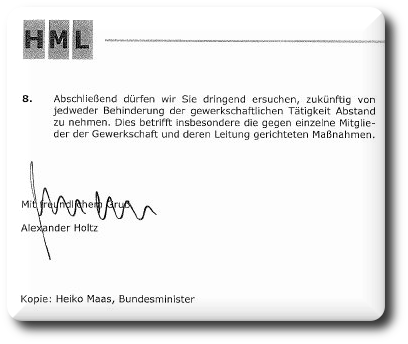
Summary: Intimidating letters from Team Battistelli are being responded to by the Holtz law firm and reported to Heiko Maas, the Federal Minister of Justice and Consumer Protection (letter in German)
IN order for true justice to be done at the EPO, the process needs to be transparent and constantly subjected to public scrutiny. That’s the cornerstone of a modern society. For some people, however, the very idea of public scrutiny may seem unacceptable.
Well, inevitably, the harder the EPO tries to keep its union-busting secret, the more people become aware of it. Streisand Effect again! Some in the EPO management have consequently become laughing stocks all around the organisation (from top to bottom). The demands of secrecy seriously backfired and people (not staff representatives) keep writing us with information, ranging from rude/foul-mouthed (directed at the more aggressive figures inside the management) to polite and informative.
“In the “harassment” case,” told us one person, “the rumor is that the allegedly aggrieved party may be none other than Mrs. Bergot herself…”
Ms Bergot is said to have been “delaying the 25 years celebration of colleagues who took unpaid leave or full-time parental leave” and also “accusing a staff representative of breaching confidentiality for merely informing staff that she has been invited by the Investigative Unit.”
Battistelli, in the mean time, shows how hypocritical Bergot has been on behalf of Team Battistelli (Bergot is a core team member, as we showed in (part one, part two, part three, and part four of “EPO: It’s Like a Family Business”), as he had been “breaching confidentiality and publicly making strong and partially bizarre accusations in a pending disciplinary case” (we covered this back in October).
In Politico, “Kantilever” has just put it like this: (enable JavaScript to see comments)
This case recently concluded with a finding by the Enlarged Board of Appeal that the accusations were inadmissible. Therefore the individual has not been found to have committed any wrongdoing, by the only body capable of taking such a decision. Clearly the President nevertheless regards the individual as guilty…
The leaking of information about the ongoing disciplinary procedure, by the President, goes against his own rules about confidentiality during such procedures. A union leader was recently suspended in Munich for allegedly leaking about a disciplinary procedure. Anyone see a double-standard here?
The allegations about weapons and Nazi materials = defamation. What were these weapons and materials? Or was it sports equipment and a history book?
Spyware (keylogging) = illegal in Germany due to strict data protection laws (Datenschutz). The President uses his cloak of immunity to get away with behaving illegally on German soil, but in truth the immunity only applies for purposes “necessary for performing [patent office staff] duties” i.e. granting patents, not spying on staff (and the public, since it was a public computer). Would love to see this go to court, but no doubt the President would cite immunity and ignore the ruling (as he recently did with a labour court ruling from The Hague).
I could go on…
Well, the allegations are basically unfounded or very weakly substantiated. Isn’t it funny that such an abusive management revels in projecting so much, calling others all sorts of names? We’ve seen mafia, Nazis, and snipers. What’s next?
“Isn’t it funny that such an abusive management revels in projecting so much, calling others all sorts of names?”The lawyer who responded to the threats to staff representatives (over relatively benign activities) reminded Team Battistelli that union activities are in general absolutely fine based on what’s allowed in Munich and are strictly protected by fundamental laws. Heiko Maas received a copy of the letter, so it’s all within view of the political system in Germany right now. Justice in secret is no justice but a staged assessment of sides with assured punishment.
In our next post we would like to show just how ludicrous a case the EPO is building against staff representatives. There is more repetition therein (than substance). It’s a sign of desperation. █
Permalink
 Send this to a friend
Send this to a friend
Posted in Europe, Patents at 8:51 pm by Dr. Roy Schestowitz

Summary: The national delegations to whom the serious abuses by the European Patent Office (EPO) can — and probably should — be reported
THE EPO‘s management is apparently (if word on the street is to be believed) shielded by fear. The continued abuse is facilitated mostly by the Administrative Council, where nobody ‘dares’ to take the first move and challenge Team Battistelli, having already seen how Battistelli can bully delegates. We have decided to make a concise summary of the situation along with the following easy-to-follow list of contacts for anyone wishing to express an opinion and/or ask national delegations to tackle the abuses.
Starting with smaller member states (or groups) and moving towards larger ones, here we go. Some E-mails may no longer be up to date or active, so contacting several people (multiple recipients) is the safest way to ensure the messages land on the right ears. For one to contact one’s officials is not political activism but an exercise in functioning democracy.
Albania
Delegates/Representatives:
elvin.lako@dppm.gov.al
elvanda.mece@dppm.gov.al
mailinf@dppm.gov.al
Bulgaria
Delegates/Representatives:
vbabaleva@bpo.bg
tnaydenova@bpo.bg
bpo@bpo.bg
Croatia
Delegates/Representatives:
ljiljana.kuterovac@dziv.hr
Cyprus
Delegates/Representatives:
skokkinos@drcor.mcit.gov.cy
eeleftheriou@drcor.mcit.gov.cy
Czech Republic
Delegates/Representatives:
jkratochvil@upv.cz
skopecka@upv.cz
posta@upv.cz
Estonia
Delegates/Representatives:
Matti.Paets@epa.ee
Margus.Viher@epa.ee
Greece
Delegates/Representatives:
ssta@obi.gr
kmar@obi.gr
info@obi.gr
Latvia
Delegates/Representatives:
guntis.ramans@lrpv.gov.lv
sandris.laganovskis@lrpv.gov.lv
valde@lrpv.lv
Lithuania
Delegates/Representatives:
rimvydas.naujokas@vpb.gov.lt
zilvinas.danys@vpb.gov.lt
Macedonia
Delegates/Representatives:
safet.emruli@ippo.gov.mk
irenaj@ippo.gov.mk
Malta
Delegates/Representatives:
godwin.warr@gov.mt
michelle.bonello@gov.mt
Monaco
Delegates/Representatives:
ekheng@gouv.mc
expansion@gouv.mc
mcpi@gouv.mc
Poland
Delegates/Representatives:
aadamczak@uprp.pl
ematysiak@uprp.pl
glachowicz@uprp.pl
Portugal
Delegates/Representatives:
leonor.trindade@inpi.pt
marco.dinis@inpi.pt
Romania
Delegates/Representatives:
ionel.muscalu@osim.ro
alexandru.strenc@osim.ro
office@osim.ro
San Marino
Delegates/Representatives:
silvia.rossi.ubm@pa.sm
b.cinquantini@ngpatent.it
Serbia
Delegates/Representatives:
btotic@zis.gov.rs
bbilenkati@zis.gov.rs
zis@zis.gov.rs
Slovakia
Delegates/Representatives:
lubos.knoth@indprop.gov.sk
lukrecia.marcokova@indprop.gov.sk
urad@indprop.gov.sk
Slovenia
Delegates/Representatives:
Vesna.StankovicJuricic@uil-sipo.si
Ales.orazem@uil-sipo.si
h.zalaznik@uil-sipo.si
sipo@uil-sipo.si
Turkey
Delegates/Representatives:
habip.asan@turkpatent.gov.tr
akocer@turkpatent.gov.tr
info@turkpatent.gov.tr
Belgium
L’Office belge de la Propriété intellectuelle (OPRI)
SPF Economie, P.M.E., Classes moyennes et Energie
City Atrium C
Rue du Progrès, 50
B-1210 Brussels, BELGIUM
Ms. Sabine Laruelle
http://www.laruelle.belgium.be/fr/equipe-et-contact
http://www.sabinelaruelle.be/homepage
info@laruelle.fgov.be
Delegates/Representatives:
jerome.debrulle@economie.fgov.be
geoffrey.bailleux@mineco.fgov.be
Netherlands
NL Octrooicentrum
Ministerie van Economische Zaken
Bezuidenhoutseweg 73
postbus 20401
NL- 2500 EK, Den Haag
NEDERLANDS
Mr. Henk Kamp
http://www.rijksoverheid.nl/regering/bewindspersonen/henk-kamp
Assistant:
b.becker@minez.nl
Spokespersons:
b.visser@minez.nl
P.vanStrien@minez.nl
t.d.vanes@minez.nl
Delegates/Representatives:
derk-jan.degroot@agentschapnl.nl
p.h.m.vanbeukering@minez.nl
Luxembourg
Office de la propriété intellectuelle
Ministère de l’Economie et du Commerce extérieur
19-21, boulevard Royal
L-2914 Luxembourg
LUXEMBOURG
Mr. Etienne Schneider
http://www.eco.public.lu/ministere/ministre/index.html
etienne.schneider@eco.etat.lu
minister@eco.etat.lu
Secretary:
catherine.lammar@eco.etat.lu
Delegates/Representatives:
lex.kaufhold@eco.etat.lu
claude.sahl@eco.etat.lu
UK
Intellectual Property Office
Department for
Business Innovation & Skills
1 Victoria Street
London SW1H 0ET
UNITED KINGDOM
Dr. Vince Cable
https://www.gov.uk/government/people/vince-cable
enquiries@bis.gsi.gov.uk
cablev@parliament.uk
Delegates/Representatives:
john.alty@ipo.gov.uk
sean.dennehey@ipo.gov.uk
Ireland
Irish Patents Office
Department of
Jobs, Enterprise and Innovation,
23 Kildare Street, Dublin 2
IRELAND
Mr. Richard Bruton
http://www.djei.ie/corporate/ministersoffice/richardbruton.htm
minister@djei.ie
Delegates/Representatives:
gerard.barrett@patentsoffice.ie
France
Institut National de la Propriété Industrielle (INPI)
Ministère de l’Économie,
des Finances et
du Commerce extérieur
139, rue de Bercy
F-75572 Paris Cedex 12
FRANCE
Mr. Emmanuel Macron
http://www.economie.gouv.fr/le-ministere/emmanuel-macron
Delegates/Representatives:
ylapierre@inpi.fr
fclaireau@inpi.fr
contact@inpi.fr
Italy
Ufficio Italiano Brevetti e Marchi
(UIBM)
Ministero dello Sviluppo Economico
Uffici del Ministro
Via Veneto 33
IT-00187 Roma
ITALIA
Ms. Federica Guidi
http://www.sviluppoeconomico.gov.it/index.php?option=com_content&view=article&idmenu=3315
segreteria.ministro@mise.gov.it
Delegates/Representatives:
mauro.masi@consap.it
loredana.gulino@mise.gov.it
Spain
Oficina Española de Patentes y Marcas
(OEPM)
Ministerio de Industria,
Energía y Turismo
Pº de la Castellana 160.
ES-28046 Madrid
ESPAÑA
Dr. José Manuel Soria López
http://www.minetur.gob.es/es-ES/Ministro/Biografia/Paginas/CV_Ministro.aspx
secretaria.ministro@mityc.es
Delegates/Representatives:
patricia.garcia-escudero@oepm.es
pedro.cartagena@oepm.es
Germany
Deutsches Marken- und Patentamt (DPMA)
Bundesministerium der Justiz (BMJ)
Mohrenstraße 37
D-10117 Berlin
DEUTSCHLAND
Mr. Heiko Maas
http://www.bmjv.de/DE/Ministerium/Hausleitung/Minister/_node.html
mail@heiko-maas.de
poststelle@bmj.bund.de
Delegates/Representatives:
ernst-ch@bmj.bund.de
info@dpma.de
Switzerland
Eidgenössisches Institut für Geistiges Eigentum
Eidgenössischen Justiz- und Polizeidepartement (EJPD)
Bundeshaus West
CH-3003 Bern
SCHWEIZ
Ms. Simonetta Sommaruga
http://www.ejpd.admin.ch/ejpd/de/home/ueber-uns/dv.html
simonetta.sommaruga@gs-ejpd.admin.ch
simonetta.sommaruga@parl.ch
Delegates/Representatives:
roland.grossenbacher@ipi.ch
christian.bock@metas.ch
info@ipi.ch
Liechtenstein
Eidgenössisches Institut für Geistiges Eigentum
Ministerium für Inneres,
Justiz und Wirtschaft
Postfach 684
9490 Vaduz
LIECHTENSTEIN
Dr. Thomas Zwiefelhofer
http://www.regierung.li/ministerien/wirtschaft/mitarbeitende-kontakt/
thomas@zwiefelhofer.net
Assistant:
Simon.Biedermann@regierung.li
Delegates/Representatives:
Sabine.Monauni@llv.li
Esther.Schindler@llv.li
ute.hammermann@avw.llv.li
info@avw.llv.li
Austria
Österreichisches Patentamt
Bundesministerium für Verkehr, Innovation und Technologie (BMVIT)
Radetzkystraße 2
A-1030 Wien
ÖSTERREICH
Mr. Alois Stöger
http://www.bmvit.gv.at/
alois.stoeger@spoe.at
Delegates/Representatives:
friedrich.roedler@patentamt.at
andrea.scheichl@patentamt.at
info@patentamt.at
Hungary
Hungarian Intellectual Property Office
Ministry of Public Administration
and Justice
Kossuth Lajos tér 2-4.
HU-1055 Budapest
HUNGARY
Dr. Tibor Navracsics
http://www.kormany.hu/en/ministry-of-public-administration-and-justice/the-minister
info@kim.gov.hu
intcomm@me.gov.hu
Delegates/Representatives:
miklos.bendzsel@hipo.gov.hu
mihaly.ficsor@hipo.gov.hu
elnokseg@hipo.gov.hu
Denmark
Danish Patent and Trademark Office (DKPTO)
Ministry for Business and Growth
Slotsholmsgade 10-12
DK-1216 København K
DENMARK
Mr. Henrik Sass Larsen
http://www.evm.dk/english/the-minister
evm@evm.dk
Press Secretary
smn@evm.dk
Delegates/Representatives:
jko@dkpto.dk
arj@dkpto.dk
mlr@dkpto.dk
knj@dkpto.dk
pbp@dkpto.dk
pvs@dkpto.dk
Sweden
Swedish Patent and Registration Office
Ministry of Justice
Rosenbad 4
SE-103 33 Stockholm
SWEDEN
Ms. Beatrice Ask
http://www.government.se/sb/d/7567
beatrice.ask@gov.se
Justitiedepartementet.registrator@regeringskansliet.se
Delegates/Representatives:
susanne.sivborg@prv.se
per.holmstrand@prv.se
Update: Beatrice Ask is no longer minister of justice, it’s Morgan Johansson. Best way of contacting is via registrator of department of justice: ju.registrator@regeringskansliet.se
Finland
National Board of Patents and Registration of Finland (NBPR)
Ministry of Employment
and the Economy
P.O. Box 32
FI-00023 GOVERNMENT
FINLAND
Mr. Jan Vapaavuori
Minister of Economic Affairs
http://www.tem.fi/index.phtml?l=en&s=2297
jan.vapaavuori@tem.fi
Secretary:
jonna.sjogren@tem.fi
Delegates/Representatives:
rauni.hagman@prh.fi
jorma.hanski@prh.fi
Norway
The Norwegian Industrial Property Office (NIPO)
Ministry of Trade and Industry
P.O.Box 8114 Dep.,
N-0030 Oslo
NORWAY
Monica Mæland, Minister of Trade and Industry
http://www.regjeringen.no/en/dep/nfd/about-the-ministry/minister-of-trade-and-industry-monica-ma.html?id=742948
postmottak@nfd.dep.no
Delegates/Representatives:
pfo@patentstyret.no
jsa@patentstyret.no
Iceland
Icelandic Patent Office
Ministry of Industries and Innovation
Skulagotu 4
150 Reykjavík
Iceland
Ragnheiður Elín Árnadóttir
Minister of Industry and Commerce
http://eng.atvinnuvegaraduneyti.is/ministers/nr/6748
rea@althingi.is
postur@anr.is
Delegates/Representatives:
borghildur@els.is
elfa@els.is
If we have left something or someone out, or if an inclusion of an entry is out of date, please let us know in the comments below.
Once upon a time someone spoke of the “Broken Governance of the European Patent Organisation”, noting that “several members of the Administration Board of the European Patent Organisation are the national patent offices themselves!”
At the time, things were different and not the same persons involved.
Nevertheless, back then the list of representatives at the Administrative Council of the EPO highlighted the fact that the Executive was also the Legislator:
BE: Office de la Propriété Intellectuelle
BG: Patent Office of the Republic of Bulgaria
CZ: Industrial Property Office of the Czech Republic
DK: Danish Patent and Trademark Office
EE: Estonian Patent Office
ES: Department, Spanish Patent and Trademark Office
FI: National Board of Patents and Registration of Finland
FR: Institut National de la Propriété Industrielle
UK: UK Intellectual Property Office
GR: Industrial Property Organisation (OBI)
HU: Hungarian Patent Office
HR: State Intellectual Property Office of the Republic of Croatia
IE: Irish Patents Office
IS: Icelandic Patent Office
IT: Office italien des brevets et des marques
LT: The State Patent Bureau of the Republic of Lithuania
LV: Latvian Patent Office
NL: Netherlands Patent Office
NO: Norwegian Industrial Property Office
PL: Patent Office of the Republic of Poland
PT: National Institute of Industrial Property
RO: State Office for Inventions and Trademarks
SE: Swedish Patent and Registration Office
SI: Slovenian Intellectual Property Office
SK: Industrial Property Office of the Slovak Republic
TR: Turkish Patent Institute
Three questions were raised at the time:
- Does the Council recognise that there is lack of separation of powers between the legislative powers and the executive powers in the European Patent Organisation?
- How does the Council view the separation of powers between the legislative and the executive powers in the future European Patent System?
- How does the Council view the fact that the same lack of separation of powers may happen inside its own institution?
That was written a long time ago, but it was rather prophetic because we still see some overlap between the legislative and executive powers. This in its own right is a subject which merits open debate. █
Permalink
 Send this to a friend
Send this to a friend
Posted in Europe, Patents at 8:39 pm by Dr. Roy Schestowitz
Martial Law imminent in Eponia? It’s definitely getting there, gradually…
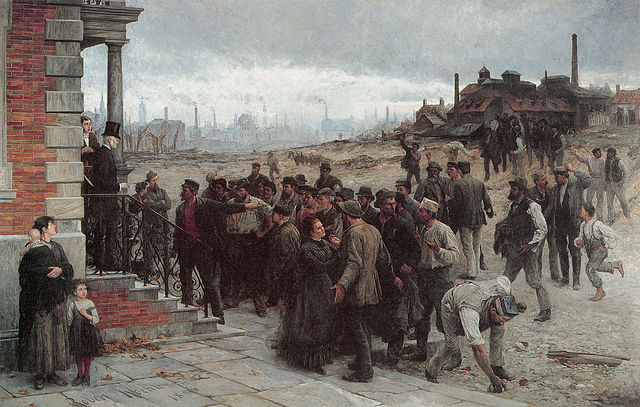
La Grève au pays de Charleroi by Robert Koehler
Summary: Attacks on the right of workers to assemble, to protest, and increasingly the freedom of association as well (more to come, in relation to staff representatives being crushed)
Željko Topić’s dark history and union-busting practices at the EPO are not really news. He seemingly likes to play the role of the bad cop. Attacks on the right to strike are a bad cop’s task, especially in the public sector (see some historical background). Here is a recent Circular, apparently resent with updates as means of deterrence ahead of many of the recent protests (now a weekly thing with high staff presence and growing recurrence in Munich):
ServRegs – Circular No. 347
Circular No. 347 (27 June 2013)
1. No. 347 Circular on Strikes
The President of the European Patent Office;
Having regard to the European Patent Convention, and in particular Article 10 thereof;
Having regard to the Service Regulations for permanent employees of the European Patent Office, and notably Articles 30, 30a, 63 and 65 thereof;
Having consulted the General Advisory Committee;
Recognising the right to strike, whilst having regard to the need for specific terms and conditions for its exercise in order to ensure a proper functioning of the Office;
Considering that a strike should be a proportionate action of last resort;
Has decided as follows:
Guidelines applicable in the event of strike
2. A. Definition
3. 1. Strike
4. A strike is defined in Article 30a(2) of the Service Regulations.
5. Industrial actions which are not a collective and concerted work stoppage, such as go-slow or work-to-rule actions, shall not be considered as a strike.
6. The protection granted by the right to strike does not apply to employees participating in industrial actions other than a strike.
7. B. Exercising the right to strike
8. 2. Call for a strike
9. A Staff Committee (Central Staff Committee or a local section), an association of employees, or a group of employees representing at least 10% of all EPO employees may decide to call for a strike.
10. 3. Decision to start a strike
11. The start of a strike shall be the result of a vote by the employees entitled to vote.
12. Entitled to vote are the active employees either office-wide or at sites concerned by the strike which has been called for.
13. The voting process shall be organised and completed by the Office within a maximum of one month following the decision to call for strike. The voters’ confidentiality shall be guaranteed. Employees not able to vote personally October 2015 180
1b
14. shall have the possibility to vote by proxy. An employee can be given only one proxy vote.
15. The voting process shall be supervised by a committee composed of two employees designated by the President and two employees designated by the Central Staff Committee on an ad hoc basis.
16. To be valid, at least 40% of the employees entitled to vote shall participate in the ballot. The decision to start the strike has to be approved by a majority of more than 50% of the voters.
17. 4. Prior notice
18. Pursuant to Article 30a(5) of the Service Regulations, prior notice of a strike shall be given to the President at least five working days before the commencement of the strike action.
19. As regards the scope of the strike, the notice shall indicate which sites of the Office are concerned.
20. The duration of the strike shall not exceed one month starting from the date indicated in the prior notice as the beginning of the strike. Beyond this maximum duration, any new strike shall be organised in compliance with Article 30a of the Service Regulations.
21. 5. Declaration of participation in a strike
22. Employees participating in a strike shall inform their immediate superior and shall register via an electronic self-registration tool made available by the Office. The immediate superior will have access to the self-registration tool.
23. The registration shall occur before or, at the latest, on the day of the strike.
24. Employees may be considered on unauthorised absence within the meaning of Article 63 of the Service Regulations if they were not at their workplace during a strike action, did not register and did not inform their immediate superior of their absence from work.
25. 6. Deduction of remuneration
26. For each working day during which an employee participated in a strike, the Office will apply a deduction of the monthly remuneration, in accordance with Article 65(1)(c) of the Service Regulations.
27. For participation in a strike for more than four hours in a single working day, the Office will apply a deduction of 1/20th of the monthly remuneration.
28. For participation in a strike for four hours or less in a single working day, the Office will apply a deduction of 1/40th of the monthly remuneration.
29. For staff working part-time, the deduction will be adjusted proportionally.
ServRegs – Circular No. 347 October 2015
30. The basis for calculating the deduction is the remuneration defined in Article 64(2) of the Service Regulations.
31. A strike participant remains covered by the social security scheme during strike and therefore continues to contribute in full to the scheme.
32. C. Entry into force
33. This decision shall enter into force on 1 July 2013.
Željko Topić
Vice-President DG 4
October 2015
This was sent around the same time the EPO was attacking bloggers, apparently defaming a judge in the media, and shortly thereafter preparing a simultaneous attack on at least three staff representatives. This is part of the ongoing escalation, echoing what we see governments do when there is a perpetual “war on terror”, taking its toll on law-abiding citizens, supposedly for the greater good. EPO management can feel the imminent “emergency” and is adjusting the rules accordingly, in order to protect the management, not the rights of workers. █
Permalink
 Send this to a friend
Send this to a friend




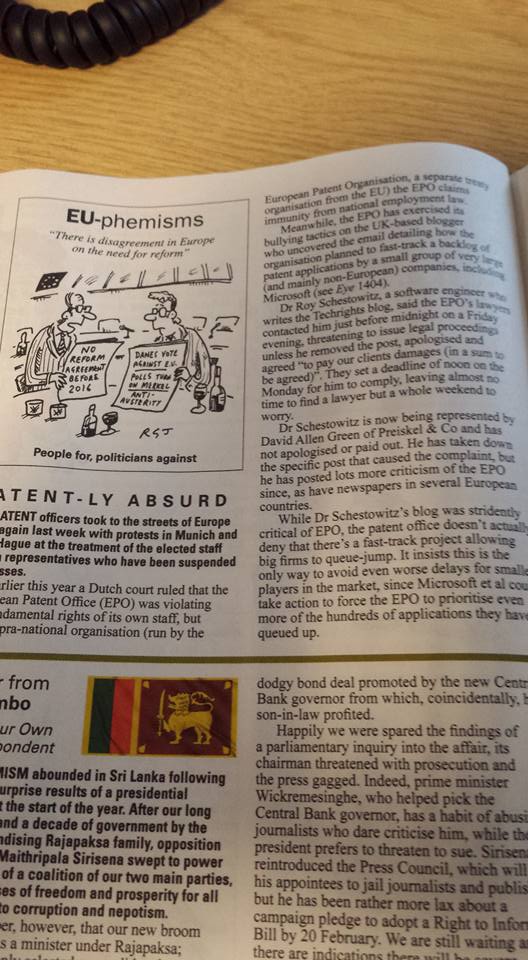
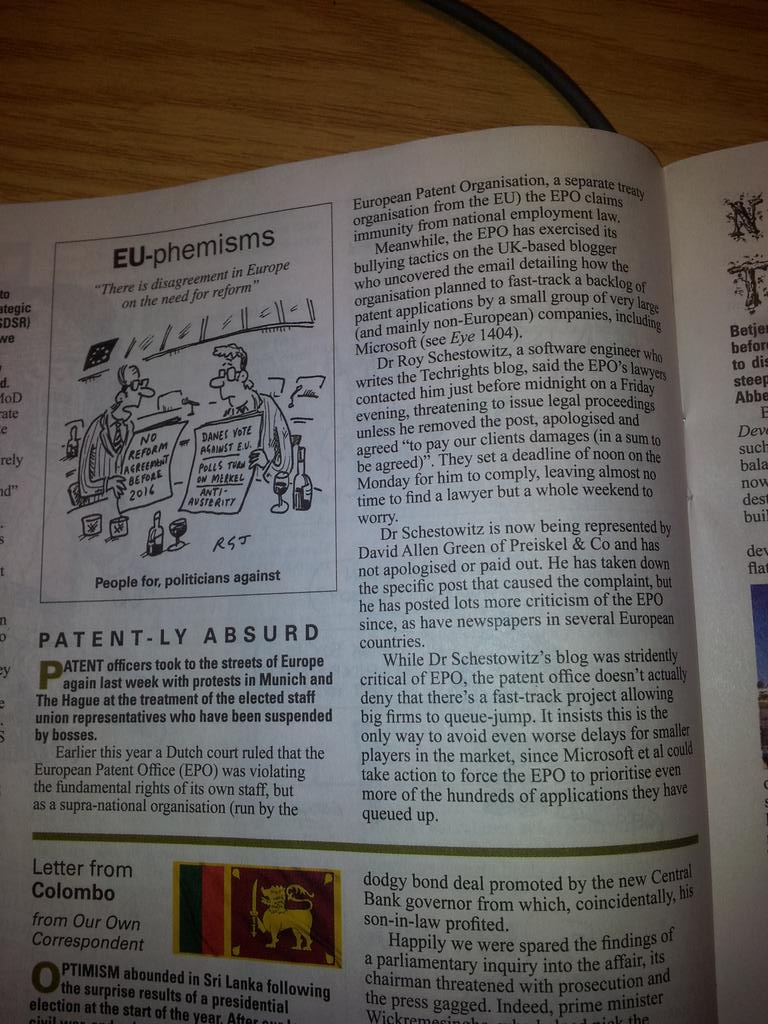
























 Content is available under CC-BY-SA
Content is available under CC-BY-SA